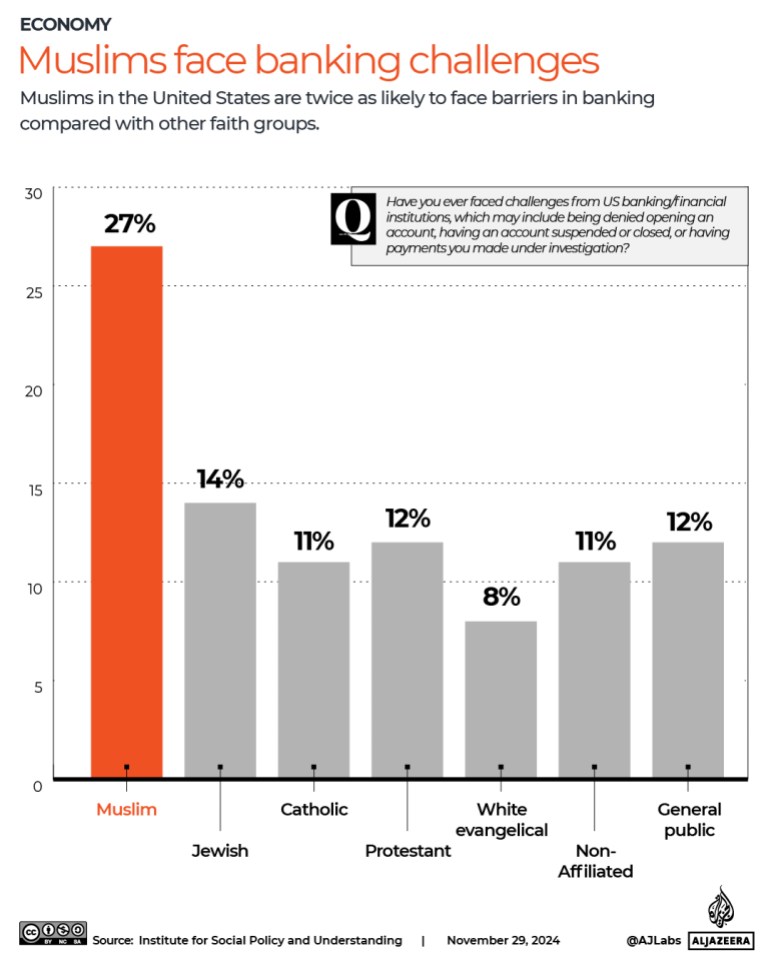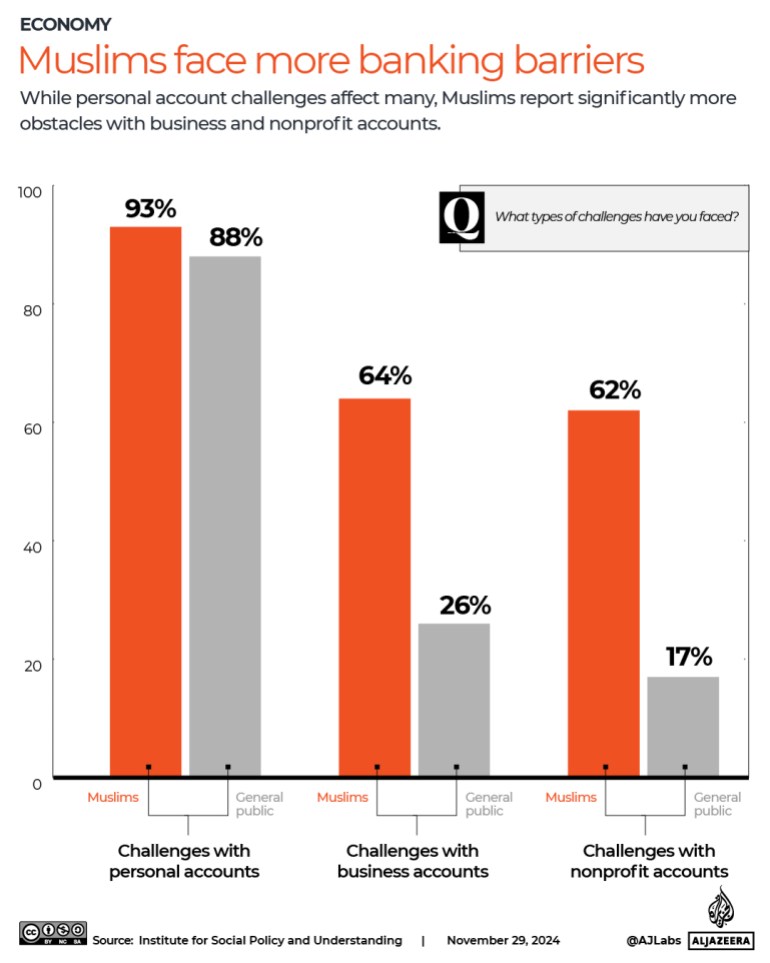As the people of Gaza face famine and the continued bombing of their homes by Israel, numerous Muslim charities and organisations are desperately trying to help keep Palestinians alive and help those in need.
However, many of these organisations have found over the past year that the banks they rely upon to help get this aid to the people of Gaza do not want to work with charities that are run by Muslims – especially if they are focused on Gaza. This has become referred to as “Muslim while banking”.
“We used to joke when we started our company that we had 99 problems and payments wasn’t one of them, and that quickly changed,” says Amany Killawi, co-founder of LaunchGood, a crowdfunding platform for Muslims. “I do feel there’s additional scrutiny on Muslim organisations.”
LaunchGood is one of many organisations that are trying to help people from Gaza who have found their payment accounts closed for no discernible reason over the past year. Killawi says she thinks these banks are afraid of receiving bad publicity for working with Muslim organisations while the highly contentious debate over the future of Israel and Palestine goes on.
“You have two problems in our space: Most banks are very risk-averse. They don’t want to support humanitarian work, even though it is all registered charities in good standing that have gone through vetting,” Killawi says. “The other issue you have is that there’s been a politicisation of humanitarian aid.”
Killawi says pro-Israel actors will write “hit pieces” in the media about various Muslim organisations that are sending aid to Gaza, and this can cause banks to not want to work with them even if they’ve ultimately done nothing wrong. These charities are sometimes wrongly accused of aiding armed groups, and those in the financial sector may not bother to investigate such claims.
“I don’t think it’s conflict with US law because everything is legal. There’s nothing that violates their terms of use. My sense is that it’s adverse media,” Killawi says. “… Israel-Palestine is a touchy subject, to say the least. You have your average analyst out of New York who’s maybe never met a Muslim or worked with [a Muslim] organisation see that and decide to pull out.”
LaunchGood has not only experienced account closures related to financial services but other services as well. Killawi says Wise, which helps LaunchGood pay contractors, has kicked it off the platform. Cledara, a subscription service that helps LaunchGood keep track of its software, also unexpectedly closed its account.
Cledara did not respond to a request for comment.
Wise told Al Jazeera that it provides its services to customers “regardless of their personal characteristics, including their religious identity” and that they are “also subject to strict rules governing how we handle existing customer accounts.”
“For legal and privacy obligations, we’re unable to provide details on individual cases, but we never take the decision to deactivate an account lightly, and this is always the result of a thorough review by our team,” a spokesperson said.

“Sometimes we are victims of our own success. A charity or platform or NGO will do really well, and once your account reaches a certain level, it may be reviewed,” Killawi says. You might be assigned a new account manager. That’s my suspicion because we’ve continued to grow. We actually don’t know. How does someone at the bank come across LaunchGood and decide, ‘We don’t want anything to do with this?’ Is there a file on us somewhere?”
Bigger trend
Ilhan Omar, a Democratic member of the United States House of Representatives, was part of a group of lawmakers who requested information in February from major banks regarding why Muslim Americans are being discriminated against. They said these account closures can have “devastating impacts on consumers”.
“The practice of ‘de-risking’ by financial institutions has had a disproportionate impact on Muslim and immigrant-owned businesses, cutting off access to essential banking services,” Omar told Al Jazeera. “This discriminatory behaviour is unacceptable.”
What is clear is that these account closures are not isolated incidents but part of a larger trend. Youssef Chouhoud, an assistant professor of political science at Christopher Newport University and a fellow at the Institute for Social Policy and Understanding, says banks have been closing the accounts of Muslim-run nonprofit organisations at a “suspiciously high rate” for years.
Things have only gotten worse as the conflict in Gaza has escalated and several humanitarian organisations in the US and Europe that are trying to provide food to residents of Gaza have had their bank accounts closed and transactions frozen since the start of the current conflict, The Wall Street Journal reported, citing at least 30 incidents from October 7 through late May.
“American Muslims are significantly more likely than the general public to report challenges while banking, whether it be at the point of opening an account, completing a transaction or maintaining an account in good standing,” Chouhoud says. “Around one in four Muslims in our survey reported such obstacles when dealing with financial institutions, which is twice the rate among the general public.” The survey was conducted before the start of the war in Gaza.
Chouhoud says this problem is “concerning on its face”, and it appears to represent widespread discriminatory practices. He says Muslim business owners and nonprofit executives are roughly twice as likely to be told by banking institutions that an international transaction they attempted was restricted, they are sending or receiving money from an “unknown person” or that a “keyword in their transaction” was flagged.
“As we note in our report, it is rather remarkable that one in three Muslims aged 30 to 49 has experienced difficulties when dealing with financial institutions. This statistic is especially alarming as this is the age cohort that is most likely to start businesses and purchase homes, but they are being prevented from fully participating in the American economy,” Chouhoud says.
Someone who is quite familiar with the practice of banks closing people’s accounts as part of this “de-risking” practice is Anas Altikriti. He is a British Iraqi who is the CEO and founder of The Cordoba Foundation. Altikriti had been a member of HSBC for 29 years when his account and the accounts of his immediate family were abruptly closed in 2014. The bank notified him that there was no opportunity to appeal this decision and not to inquire about it.
“This was out of the blue. There was no issue. There was no problem,” Altikriti tells Al Jazeera.
Altikriti learned through the help of Radio 4 journalist Peter Oborne that The Cordoba Foundation had inexplicably been labelled a terrorist organisation by a risk analysis company called World-Check, which led to the account closures.
“I was dumbfounded. I said this is beyond belief,” Altikriti says. “Since then, I’ve had 18 accounts closed. It’s become sort of a merry-go-round. You realise that without a bank account, in this day and age, you simply cannot operate. You can’t get on a bus. You can’t do the very simplest of things.”
Solving this problem won’t be easy, and it’s unclear how the election of President-elect Donald Trump will affect the landscape, considering he is a major supporter of Israeli Prime Minister Benjamin Netanyahu and has promised to deport all immigrants who support Hamas and expel students who are “anti-Semitic”.
That said, Chouhoud and others in the Muslim community remain determined to increase awareness of this problem and do what they can to address it.
“The letter that Senator Elizabeth Warren and her colleagues in Congress wrote to the CEOs of JPMorgan Chase and Citibank was certainly encouraging. There have also been a number of good faith meetings with officials in the White House tasked with rectifying the differential treatment Muslims, Black Americans and recent immigrants face when banking,” Chouhoud says. “The outcome of this year’s election – not just for president, but in the House and Senate – will have a tremendous impact on how far these nascent efforts for more equitable treatment will go.”
Citibank and JPMorgan Chase both declined a request for comment.
Killawi says LaunchGood is working to become its own payment processor with a company called PayGood, and it’s trying to spread the word about problems with “banking while Muslim”. It hopes these efforts will help reverse the trend of Muslims being unable to maintain access to financial institutions.


